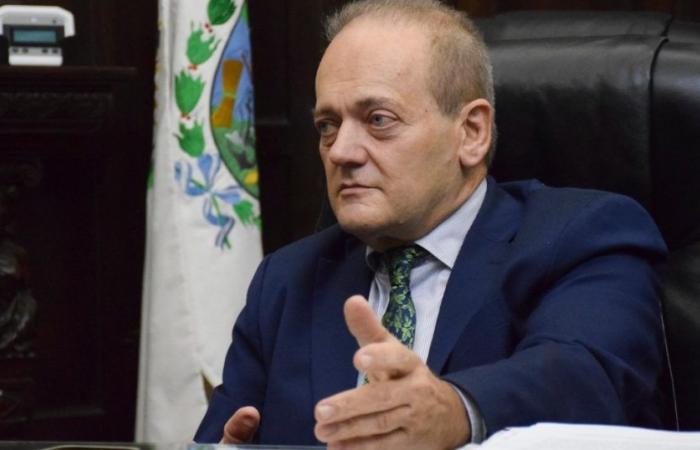
The president of College of Physicians of the 2nd Circumscription, Alberto Tuninetti, asked that the bills that establish minimum fees for professionals and set a period of no more than 30 days for collection. Thus he went out to respond to the threat of the provincial government, which advanced Rosario3 this Saturday, to pursue the collection of medical bonuses, demanding to “sit down and see the real numbers” since a doctor “today charges 6,200 pesos per Iapos consultation”, something that has not been updated since December and is paid up to six months. To avoid the collection of coinsurance or copayments, something that has “depersonalized the doctor-patient relationship,” they encourage the establishment of at least a floor for each service or consultation.
There are two bills that propose minimum medical fees in the province. One was prepared and supported by the College, and was submitted to the Santa Fe Legislature by the deputy Sonia Martorano, former Minister of Health. The other was presented in the upper house by the Senator Germán Giacomino (Constitution Department). Both are similar although they differ in the calculation to set the fees.
Tuninetti, who until recently was the head of the Plastic Surgery service and the Burns Unit at the Víctor J. Vilela Children’s Hospital and today is the new president of the area’s College, also spoke about other projects such as toughen penalties for those who attack health personnel and from one special registration for those who are about to retire. He also announced that the institution, in agreement with the Ministry of Health, is carrying out the process to homologate medical degrees at the national level.
-Why do we have to regulate or establish minimum medical fees?
-Because with the economic situation in recent years, medical fees have deteriorated in such a way that There is such a big gap between what the professional receives and what he must pay as operating costs. This means that the patient must pay coinsurance for a consultation and we want to avoid it so that the patient stops paying that difference and the doctor has to constantly watch his fees. This affects the doctor-patient relationship. Another issue is the time in which these fees are paid, which range from 60 or 90 days and up to six months.. That is why a minimum medical professional fee is proposed and a time within 30 days for payment after having carried out the consultation, medical practice or studies, i.e. that it is collected within a reasonable time, especially in times of inflation.
-This Saturday Rosario3 published that an advance by the Ministry of Finance of the Province is coming against doctors, clinics and sanatoriums for the collection of bonuses…
-First We should sit down and see what the real numbers are like., what the values are and if they are willing to pay them. You have to speak with reality and that does not stand up to another analysis. Today there is no reference value, the values are completely outdated. This leads to several doctors no longer being able to provide care.
-How much does a doctor earn for a consultation?
– Today a medical professional charges about 6,200 pesos from Iapos and with respect to the rest of the social works, this value is very heterogeneous. It is a value that has not been updated since last December and the professional must deduct taxes from it, some pay monotax, then the sanatorium institution withholds a percentage that varies between 20 or 30 percent, and there are others that pay taxes on top of that. Profits. Definitely, The doctor ends up charging 3 or 4 thousand pesos for that consultation.
-What is the value proposed in the bill promoted by the College?
-A value of four pension modules is set according to the Professionals Fund that arises from a study that is carried out and should be adjusted as these modules are updated. We are talking from about 16 thousand to about 18,100 pesos. That is at least in the project that we promoted and that Congresswoman Martorano presented. It must be taken into account that as a professional Association we presented this initiative based on the request of colleagues when in reality the negotiation of tariffs is carried out by the union organizations. There is another project that proposes a percentage on the minimum and living wage. They are two different proposals, but at least we ask that a good result can be reached and something can be achieved.
Photo: College of Physicians.
-Has this been discussed with the provincial legislators, taking into account that there are several doctors among them (Martorano, Miguel Rabbia, Antonio Bonfatti, among others)? What do you expect from them?
–We hope for a quick resolution and favorable since both projects do not have major differences and would allow us to unblock this conflict that has been going on for a long time, both for the professionals and the patients who must pay extra.
-If doctors’ fees are regulated, doesn’t this open the door to having to regulate fees for other professions?
-I don’t know the fees of other professions. I think it is necessary to do so with doctors, at least minimum fees and that they be paid within a period of no more than 30 days. There are doctors who cannot afford the operating costs of an office. And we are losing that of the family doctors in the neighborhoods who came to the patient’s house. That relationship between doctor and patient is becoming depersonalized.
-Is the need to establish minimum fees also due to the decision of professionals to choose more profitable specialties to the detriment of others and the choice of many to leave the country?
-It is a phenomenon that has been going on for years. Already in 2015, when there were calls to fill positions, in Anesthesia there were 14 interested parties for each position or in Dermatology there were 12 for each one, while for Intensive Care or Pediatric Intensive Therapy there were no interested parties. It is also a reality that others choose to go abroad for economic and security reasons. This phenomenon is not just for young people.there are 50-year-old colleagues who leave the country and That didn’t happen before.
-Do other provinces also promote similar initiatives?
-We spoke with other provinces but no one has regulated it and they are very interested in the Santa Fe project. It would be very good if this was resolved at the country level.
-There are other projects in Deputies that have to do with doctors and one is the one that toughens penalties for those who attack professionals when they provide care in a hospital or health center…
-Because it has been increasingly common for a long time and The type of attacks is increasingly serious. Protection must be given to health personnel and also to the teacher in the same sense.
“J” or senior registration
-What does the J Registration project for doctors consist of?
-Personally, I call it “senior registration.” A professional with several years of experience and knowledge cannot be underestimated.you may not be able to continue working, but you can do teaching, consult or lead a work team, that experience that cannot be missed. There is a consensus among professionals, and fundamentally those who are close to retiring, that Retirement is not enough and you need to continue working. Today when someone retires they have to leave their registration and with this project it is a way to keep it in order to generate other income and continue being useful. The school staff told me that When professionals come to leave their registration it is as if they came to leave an organ.
Homologation of titles
-Can the medical degree be homologated at the national level from Rosario?
-We agreed with the National Ministry of Health to recognize our provincial registrations, both the medical title and the specialties. So Professionals can move within the country and take advantage of agreements with other countries. There is a great demand for colleagues to be able to approve and Every week we have between 30 and 50 doctors who come to collect their approved diploma.
-Does this allow you to practice abroad then?
-The relationship with the outside It depends on each country and each region. Spain or Italy first approve the medical degree and the specialties take longers, unless a region needs a certain specialist and that works out faster.
-How is the procedure done?
-It does online and the certificates are delivered personally here in Rosario. It is not expensive. For doctors who are not used to the electronic system, The School has an advisory service through the Secretariat that helps carry out the procedure and in a few days they will have their national doctor registration that even appears in the My Argentina application.





